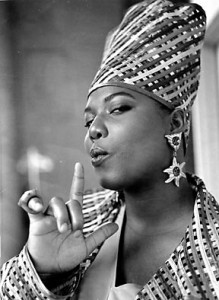 When I first met Queen Latifah, I called her “ma’am” and got a lecture.
When I first met Queen Latifah, I called her “ma’am” and got a lecture.
“Who you calling ma’am? My mother is not around.”
I was mortified. I was a newbie entertainment journalist who scored the dream of talking to one of my heroes. It was in 1999 when Latifah launched her (short-lived) eponymous talk show. I couldn’t figure out what to call her and show both respect and knowledge of her influential career. Do I call her Dana? Ms. Owens? Latifah? The Queen? (For the record, it’s “Latifah.”) I got nervous and fumbled, but quickly redeemed myself by gushing about how I grew up with her TV show, “Living Single,” and most of all was changed by her music. She told me, “You’re all right,” which I so wish she had written on a napkin so I could have framed it and looked to it in moments of self-doubt over all these years.
Listening to her music offers an equal ego boost.
Today she’s a Cover Girl and an Oscar-nominated actress, but when the world first met Queen Latifah, she was nothing short of a feminist revolutionary. Her debut album, “All Hail The Queen,” tackled topics such as black-on-black crime, socialized poverty and pretty much every pertinent feminist issue–from rape to domestic patriarchy–in the iconic single, “Ladies First.” Her flow–on par with LL Cool J and Chuck D–was as penetrating as her message: Look at me, respect me, listen to me–and bow down. The album sold more than 1 million copies. She was 19.
There were plenty of female pop icons in 1989, but none exhibited the confidence that Latifah oozed. I remember watching her videos, admiring her regal, African clothing and flawless skin and thinking: She is such a badass! I wanted to be Madonna, but I wanted to listen to what Latifah had to say–which was a lot.
Social issues dominated her lyrics, and feminist anthems were a natural. After “Ladies First” came “U.N.I.T.Y.”, which takes on sexism in music lyrics (often those of her peers), sexual harassment, domestic violence, and female misogyny:
I bring wrath to those who disrespect me like a dame/That’s why I’m talking, one day I was walking down the block/ I had my cutoff shorts on right cause it was crazy hot/I walked past these dudes when they passed me/One of ‘em felt my booty, he was nasty/I turned around red, somebody was catching the wrath/Then the little one said (Yeah me bitch) and laughed/Since he was with his boys he tried to break fly/ Huh, I punched him dead in his eye and said “Who you calling a bitch?”
Latifah could compete with the boys of hip-hop but she never pretended to be anything but a woman. She not only sang about female empowerment, but she wrote about being a woman–from the insecurities we sometimes feel to the nirvana of being in love. Sensuality and femininity were always as important to her as strength.
Captivate my soul, hold me/When I’m down I need your love to console me/ Some weakness tells me when the morning comes/ It’s hard for me to try to see you’re not the one/ For the love of you I just might just do most anything – “Give Me Your Love”
Latifah lives her feminism as well. Just two years after her debut album, she became the chief executive of Flavor Unit, which put her in the position to foster young, female musical talent. She built a brand on her image, which was one she never apologized for, despite the fact that she in no way fit the typical celebrity mold. She modeled because it was always a dream of hers. She made jazz records because she always loved the music. She has always been undeniably herself, which is the thing I admire most about her still to this day.
Latifah actually means “delicate and sensitive” in Arabic. But make no mistake, The Queen is all powerful.